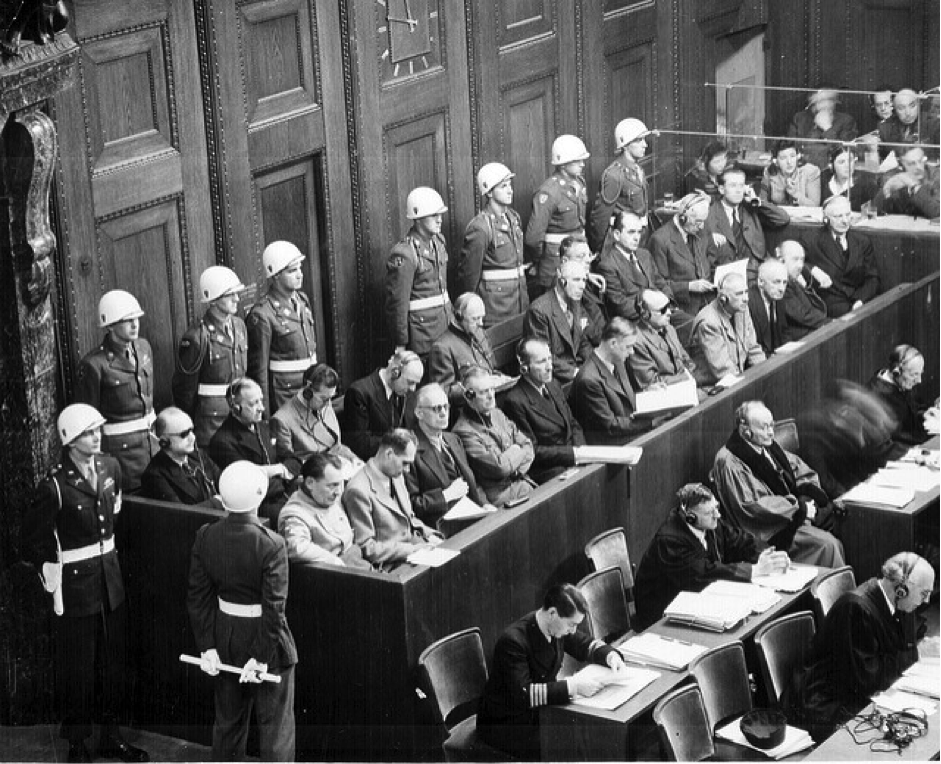This week, we commemorated the 70th anniversary of the Nuremberg trials by sharing a film produced by Masters students at Met Film School in association with RightsInfo. The film follows David Maxwell Fyfe from the trials of Nazi war criminals to the drafting of the European Convention on Human Rights.
Who was David Maxwell Fyfe?
David Maxwell Fyfe was a criminal barrister and Conservative MP who served as Solicitor-General in British Prime Minister Winston Churchill’s government.
After World War II, having served as a major in the Judge Advocate-General’s department before being badly injured in an air raid, Maxwell Fyfe acted as the Deputy British prosecutor at the Nuremberg trials. He had a key role in drafting the European Convention on Human Rights (ECHR) and the Universal Declaration on Human Rights. After that, he was Home Secretary for about three years.
What were the Nuremberg Trials?

The Nuremberg trials were a series of military tribunals formed to try Nazis for their crimes. Although Maxwell Fyfe was the Deputy British prosecutor, he took on most of the day-to-day responsibilities. The first and best known trial was of the major war criminals, but that wasn’t the only trial that took place; doctors, judges and organisations were also tried. We have more information on the Nuremberg trials here.
What’s the link between the Nazi’s crimes and the rights protected by the ECHR?

The road to the gas chambers was paved with the denial of the basic rights of Jews, of gypsies, of homosexuals. You can see from the ECHR that many of the protected rights are a response to the crimes committed by the Nazis.
For example, the right to life confronts the use of gas chambers to exterminate Jews. Article 3, if in force before the Holocaust, would have prohibited the torture seen in the Nazi’s human experimentation, including by doctors, as seen in the doctor’s trial. The guarantees of free expression and assembly respond to Hitler’s objection to rebellion after the Reichstag fire. The right to a fair trial protects against the puppet courts presided over by the Nazi judges prosecuted in the judge’s trial. The prohibition on discrimination confronts the terrors of WWII and addresses the Nazi’s ‘master race’ ideology.
How did Maxwell Fyfe and others create the ECHR to prevent future repeats of the Nazi crimes?
Maxwell Fyfe played a primary role in producing the first draft of the ECHR. The drafting committee started with a basic list of rights that needed protection, which was subsequently formed into the ECHR we know today. Maxwell Fyfe described the resulting ECHR as a ‘light’ that would be ‘a beacon to those at the moment in totalitarian darkness and will give them a hope of return to freedom’.
How successful the ECHR been, after Maxwell Fyfe’s death?

Maxwell Fyfe was proud of his achievement, despite some initial disappointment with the ECHR at the time it was finished. He later admitted that the drafting of the ECHR was imperfect in two parts (though he expressed surprised that bad drafting could only be found in two sections). Maxwell Fyfe said, “On the whole, if I may give myself one pat on the back, I do not think it has been at all badly done.”
Maxwell Fyfe died on 27 January 1967, only having seen a glimpse of the impact the ECHR had on the lives of hundreds of millions of Europeans. What would perhaps surprise him most is the volume of cases heard by the European Court of Human Rights. It couldn’t have been anticipated when the ECHR was written, and for many years after, that within 60 years the Court would have delivered nearly 20,000 decisions.
During the debates about the terms of the ECHR, Maxwell Fyfe said that ‘The old view that judges took no cognisance of the facts of life is, fortunately, becoming less and less tenable”, foreseeing the principle from Tyrer v United Kingdom of treating the ECHR as a ‘living instrument’, to be interpreted in present-day conditions.
Despite his advancement of the ECHR, Maxwell Fyfe is also a controversial figure and a flawed one. There are potentially two human rights advances Maxwell-Fyfe wouldn’t have liked. First, the abolition of the death penalty because, as Home Secretary, he refused to recommend that the death sentence imposed on David Bentley, who suffered mental deficiencies, be changed to life imprisonment. Second is the way human rights challenge laws which unfairly discriminate against gay people, like these examples. He once said ‘I am not going down in history as the man who made sodomy legal’.
For more information:
- Take a look at our explainer on the Nuremberg trials.
- Read the companion piece to the Met Film School video.
- Read our post: How British Is the European Convention On Human Rights?







